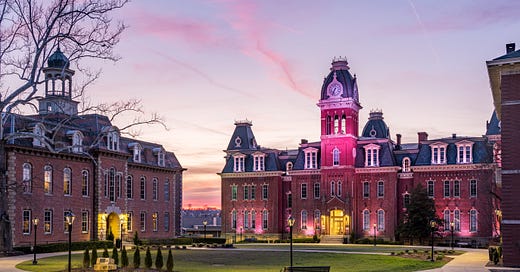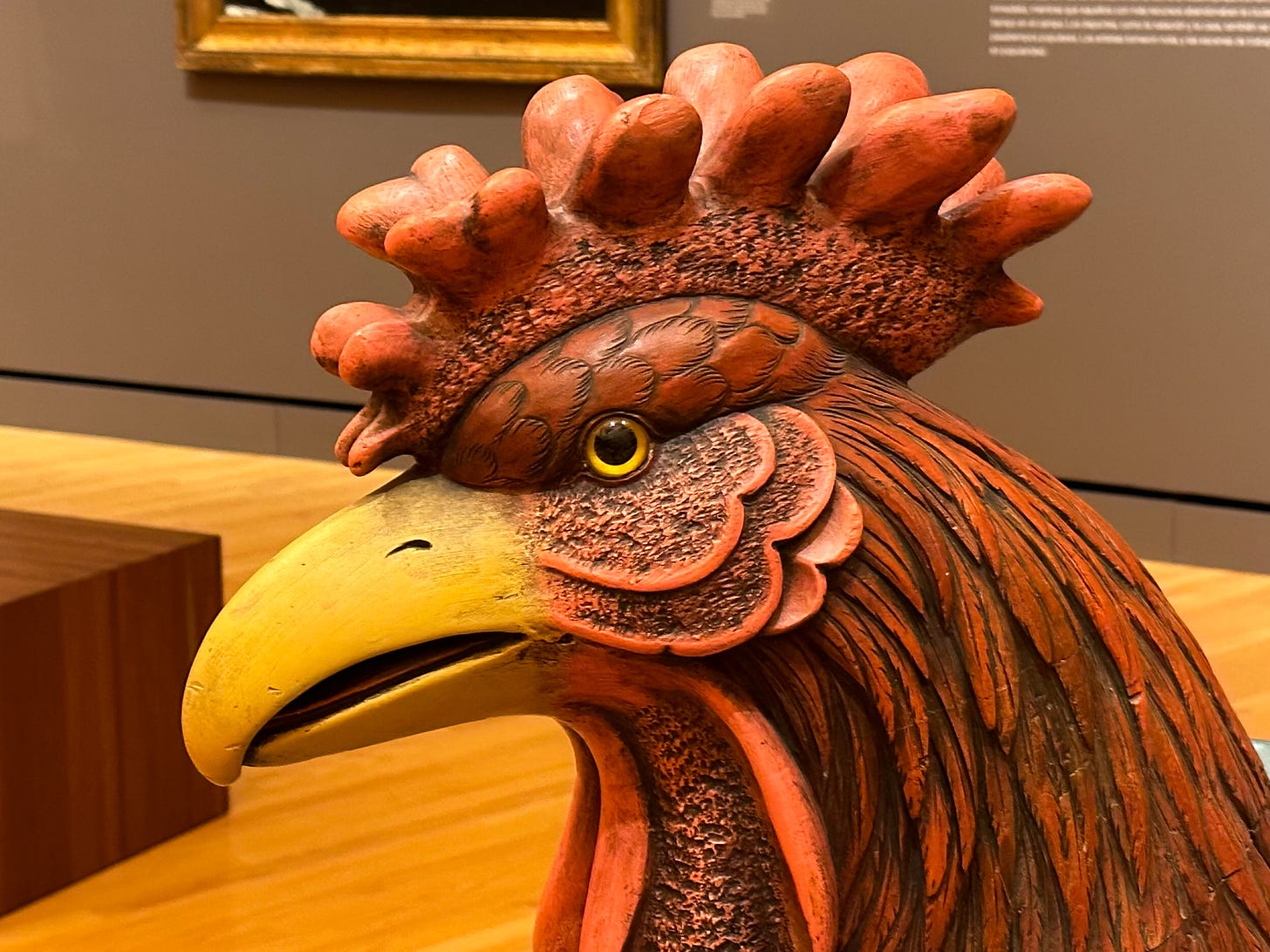What's happening to WVU: a concern for all of us
Cuts to humanities, foreign language, and literature also imperils science.
I just got back from a vacation. It was glorious. I took just a week and a half off1, and I was making a point to do as little work as possible. Which meant that I was mostly off social media and staying away from news in general. But when I strolled online to post some photos or respond to urgent matters, one thing caught my attention. I read a few articles. It has me worried, and I’d like to talk about it.
Do you know what’s going on at the University of West Virginia?
If you haven’t heard, let me give you a quick rundown: In what appears to be a manufactured crisis, the university is quickly moving towards the elimination of 12 majors, 20 grad programs, and 7% of the full-time faculty, mostly targeting foreign languages and literature, and related fields in the humanities and arts.
You can learn more about this from The Washington Post, The Nation, and New York Magazine. Which is where I’ve learned about it, as well as more direct reports from people on the ground via Bluesky and the site formerly known as Twitter.
This isn’t the first time that universities have made major cuts in response to financial exigency, so why is this time so different and concerning? There are a few factors at play.
This move is transparently not about operational efficiency or balancing the budget. It appears only one administrator is getting cut, and many of the programs getting cut are serving large numbers of students. They might not have a lot of majors enrolled but are an important part of education for students throughout the university. (Like scientists!) So students from all fields who are being trained at WVU won’t have an opportunity to learn about languages, culture, and intercultural understanding, because the programs teaching those courses are being cut and the faculty doing this work are teed up for being fired.
The other concerning part about this is that it’s coming wholly from mainstream educational establishment. This isn’t like what’s happening at New College (which is also very disturbing in a different way, driven by a governor who is systematically stripping common decency from his state). The President of WVU is very much a university insider and has been the president of other big universities. While he might be controversial, he’s also a card-carrying member of the well-entrenched establishment in higher education.
What’s even worse is that this plan to strip humanities and arts from WVU is being structured by the consulting firm rpk GROUP, whose client list2 might very well include your own university, which includes small privates, large state university systems, flagship R1s, community colleges, (and perhaps most telling includes) foundations that have a history of undermining public education by pushing for charter schools.
The bottom line is that everybody involved agrees that these plans for WVU are about “restructuring” the university. What the hell kind of restructuring involves taking away foreign language and culture from a flagship state university? This is an institution that is responsible for educating future teachers for the state of West Virginia. How is it okay to simply subtract students from accessing curricular access to a foundational piece of their education? Because they are working to transform what is considered foundational. Apparently, cultural competency doesn’t matter to these folks. If this consulting firm, which is well attached to so many other universities, is mapping out this as the future of higher education, then we need to spend more time advocating for for the education that we need.
As one of the articles I linked to above says, “WVU is a harbinger of what awaits much of US higher education.”
I feel like I shouldn't have to explain why this is important for scientists, but the choir still needs a sermon once in a while. Science needs scientists who speak multiple languages, understand people from other cultures, have a working understanding of ethics, and work to promote understanding and collaboration. When you take away programs in the university that foster this work, you’re taking away from the development of scientists. International collaboration is increasingly important for scientific research in the United States and we need to not only train scientists ready to work with people abroad but also to create an environment that is supportive of immigrants who bring their talents to the US. When you eliminate the programs that teach English language to students whose first language who isn’t English, that’s straight-up isolationism and is bad news for training scientists.
What can we do about this? Well, we should learn more. If your university or university system is working with these consultants, then this is something to raise as a concern at faculty senate or whatever you have at your institution. You could talk to colleagues in the humanities and arts in your institution and ask them what they might want from you to make sure that you have their back.
Oh, and welcome back to a new semester! What might we have on the plate at Science for Everyone? Let me know what you’re interested in. Things on my plate include: chairing a search committee, our college restructuring (in a good way) how we get workload for mentoring student researchers, formally and informally mentoring people outside your lab/department, balancing proposal writing and manuscript writing, knowing when to tie the bow on a line of research and move into new areas, and more.
Let me tell you about my vacation. We were dropping the F1 off for another year of college and made it a road trip to see parts of the country we hadn’t been to before. Climate change kept us from doing extended walks as this was a triple-digit-fahrenheit experience for the entire time, but we managed to see a lot. Including Monument Valley, Chaco Canyon, Mesa Verde, the Ozarks, Prairie Lights, and lot of other stuff. The Crystal Bridges Museum of American Art was a lot better than I expected. (Though I suppose some contemporary Robber Barons like Waltons and Sacklers and Broad would be expected to fund nice museums just like old timey robber barons such as Frick, Getty, Huntington, Guggenheim, Tate, and Vanderbilt Whitney, though I wouldn’t classify The Broad as a nice museum.) The biggest highlight might have been The City Museum in St. Louis, which my spouse has had me excited about for 20 years and this was my first visit and it more than lived up to the hype. Wow. Here are a few vacation photos.
Achieving The Dream
Akilah School for Girls – Rwanda
American Association of Colleges for Teacher Education
American Association of State Colleges and Universities
American Council on Education
American Public Land Grant Universities
Anne Arundel Community College
Aspen Institute
Association of Governing Boards of Colleges and Universities
Bill and Melinda Gates Foundation
Carroll Community College
Cecil Community College
Church Divinity School of the Pacific
College Futures Foundation
Delaware State University
Dillard University
East Carolina University
East Tennessee State University
EDUCAUSE
Emerson College
Equity Accelerator
Excelsior College
Frederick Community College
Gallaudet University
Goucher College
Gulf Coast State College
Hartford Seminary
Hilbert College
Howard Community College
Jarvis Christian College
Jobs for the Future (JFF)
Kansas Board of Regents
Keuka College
KnowledgeWorks
Loyola Marymount University
Loyola University Maryland
Lumina Foundation
Marshall University
Michigan Technological University
Midwestern State University
NACUBO
New Jersey City University
Next Generation Learning Challenges
Northeast Ohio Medical University
Northwest Missouri State University
Notre Dame of Maryland University
Oakland Community College
Ohio Association of Community Colleges
Pittsburg State University
Quality Assurance Commons
Rider University
Rockefeller Philanthropy Advisors
Rockhurst University
Shepherd University
St. Bonaventure University
St. John’s University
Saint Xavier University
SRI
SUNY Erie
SUNY System
The City University of New York
The George Washington University
The University of Texas at Austin
The University of Texas at Dallas
The William and Flora Hewlett Foundation
The World Bank
Trinity Church Wall Street
University of California, Riverside
University of Central Missouri
University of Kansas
University System of Maryland
University of Missouri-Kansas City
University of Missouri
University of Missouri System
University of North Carolina System
University of North Carolina Greensboro
University of St. Thomas
University of South Carolina
University of Virginia
University of West Florida
Utica College
Vermont State Colleges System
Vietnamese-German University – Ho Chi Min City, Vietnam
Washington State University Tri-Cities
West Virginia Higher Education Policy Commission
West Virginia University
Source: https://rpkgroup.com/clients/ accessed 27 Aug 2023








This WVA situation is very scary. It feels like things are escalating. And this: “Because they are working to transform what is considered foundational” is the scariest part!
I definitely hope that scientists will pay attention and advocate against this kind of “restructuring”. I know we can find the time for this kind of thing, because I saw it during the pandemic and in response to movements like BLM. But I am afraid that we are all kept so busy with so much work (and self-promotion), and different domains are so siloed at most universities, that scientists will find it too easy to ignore things. But we are in the slowly boiling pot, too!
I’m looking forward to your upcoming newsletters. One thing I’d love to hear you write about (maybe you have already) is something I saw a lot in the last couple of years (and discuss a bit in my newsletter that I hope to get out later today)--a big upsurge in students motivated only by applied work and a decline in interest in basic or fundamental science. Are you seeing this as well, and what might be behind it?